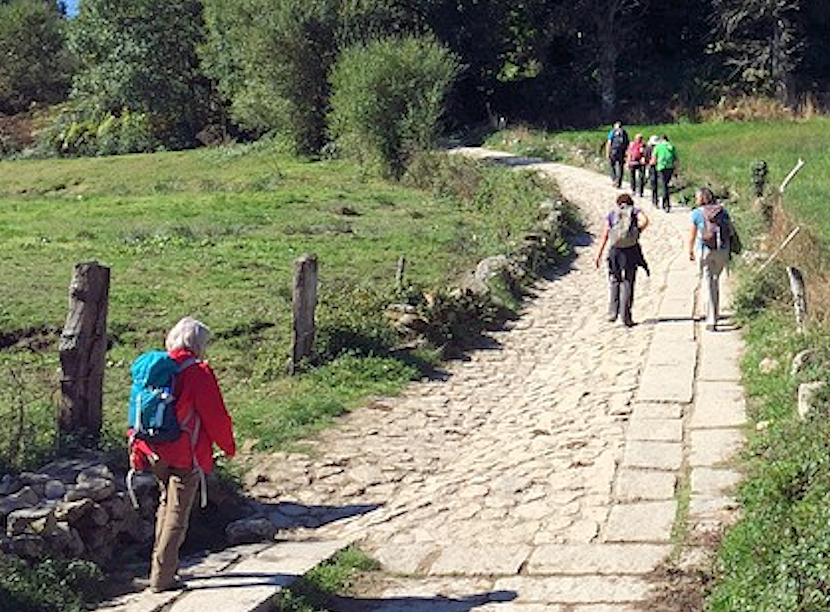Have you ever thought of life as a journey, and yourself as a pilgrim on that journey?
The story of the two disciples on the road to Emmaus is a story about two pilgrims on a journey of discovery (Gospel of Luke 24:13-35). When these two disciples set out on their journey, they talked about their doubts and confusion concerning Jesus who was put to an ignominious death. They were devastated by what had happened. Along the journey, as they were pondering these things, they were joined by a mysterious stranger who was Jesus in disguise. He engaged them in conversation about the Messiah and the Scriptures, and opened their minds to understand that the one they doubted had to undergo everything that happened to Him. They were so taken by the mysterious stranger’s explanations that they invited Him into their home for a meal. It was during this act of hospitality that they recognized him in ”the breaking of the bread.”
We are like the two disciples in this scripture. We are on a journey, not a linear journey of ease, but a sometimes painful journey of ups -and-downs, doubts and obstacles, joys and woes much like the two disciples who were tempted to give up. That was until the risen Christ came into their lives, and renewed their waning faith.
There are valuable lessons to be learnt from this journey of discovery on the road to Emmaus:
- The two pilgrims learnt the importance of familiarity with the Scriptures, the word of God, in their lives. The Lord continues to speak to us through the Scriptures just as he spoke to the two men in St. Luke’s gospel. Over and over again, the Lord blesses those who listen to his word, internally, and practice it. Reading the Scriptures, especially the New Testament, every day should be a normal way of life for every Christian. It does not have to take long. Can you spare ten or fifteen minutes meditating on his word in the morning or in the evening?
- Jesus was revealed to the two disciples in “the breaking of the bread.” The early Christians referred to the Eucharist as the breaking of the bread for, in the Eucharist, Jesus becomes our spiritual food. We welcome him into our lives by receiving him in the Eucharist, and following him.
- Hospitality opened the doors of heaven’s gates to these two disciples. In welcoming the stranger, which is expected of every Christian (Matthew 25: 35), the two disciples welcomed Christ. Always be hospitable to others. Welcome them into your home, be kind to them, and share your food and drink with them. Be a good neighbor.
- The two disciples rushed back to tell the other disciples about their experience. They witnessed or shared the good news of the gospel with others. The gospel is good news, and should be shared with those you meet in thought, word, and deed. Jesus is the Way, the Truth, and the Life. Try to be an example of his way, his truth, and his life to others.
- You never walk alone. No matter how dark life gets, no matter what you’re going through, you’re in good hands. Jesus has your back and he walks beside you and before you. He is your forever friend, and will never let you down. Put your trust in him.
The story of these two disciples who encountered the risen Christ on the road to Emmaus is also our story. Pilgrimage is a favorite theme of St. Luke’s entire gospel. At the beginning, Jesus began his ministry by instructing his disciples along the road (Luke 9:51). On the road to Emmaus, as we have seen, this journey reached its climax when the two pilgrims finally got it, when they found what they were looking for, and understood the meaning of their pilgrimage.
The whole of God’s intricate plan for people of faith, like the disciples on the road to Emmaus, has been worked out in the life of Jesus who opens our eyes.
—Fr. Hugh Duffy











3 Comments
Bartholomew Okere
Fr. Duffy, thanks to your classic exposae on the absent-present Jesus with the two of his disciples on their road to Emmaus. By reminding us that we’re all pilgims on earth matching with Jesus as our tour guard. The story of Emmaus is our story as well. That we should be hospitable & charitable with one another as did the two disciples to a stranger Jesus on their way to Emmaus. Remain blessed!
Tom Rooney
Thank you father Duffy ,as always one of your eye-opening messages
Patricia
Beautiful message, beautiful song🎶🎶👍💐